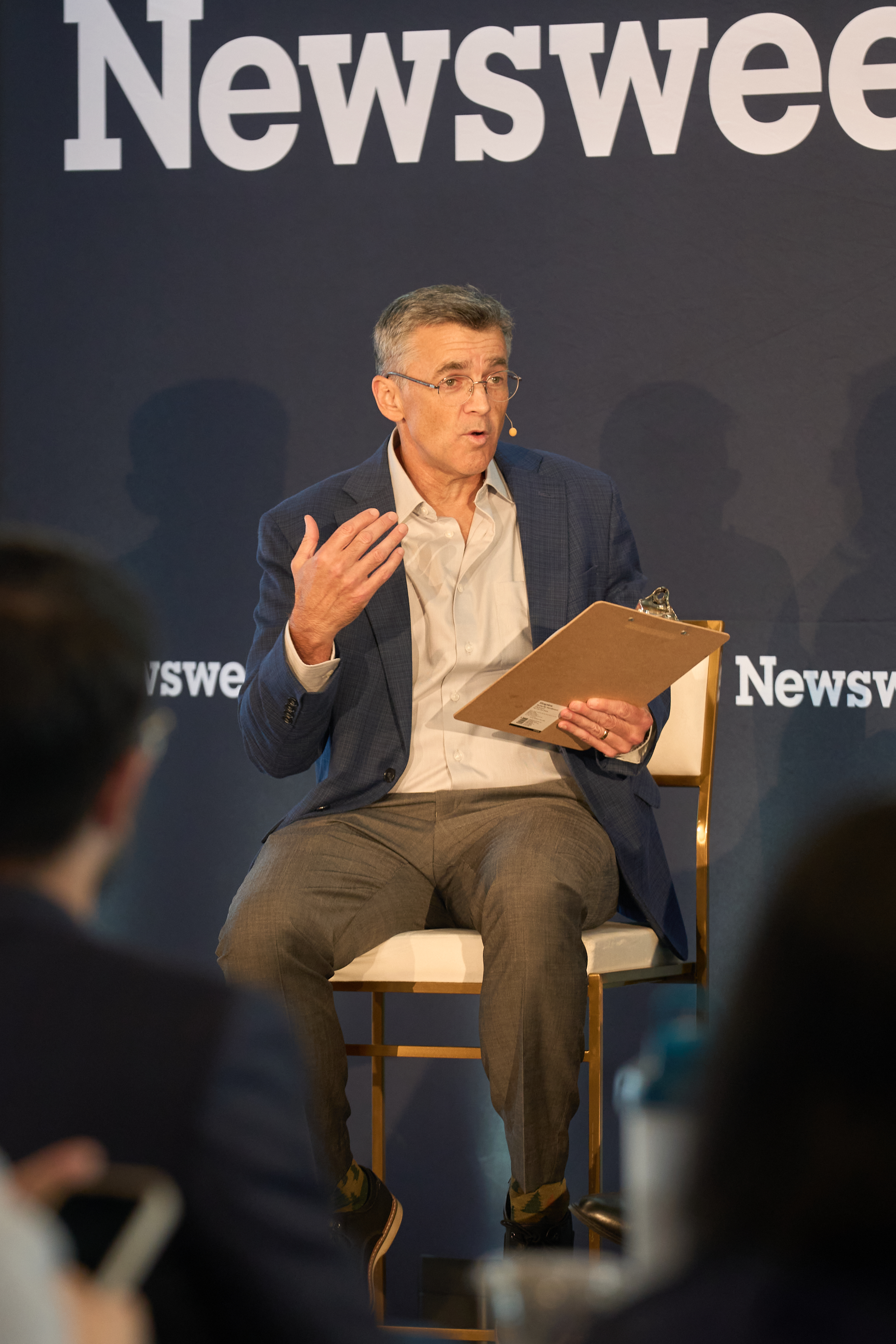
Solving the climate crisis amid today’s political landscape can feel at best sluggish and at worst helpless. But clean energy leaders are pushing forward.
Executives from across the sustainability spectrum gathered at Newsweek’s “Powering Ahead” event on Thursday to offer practical solutions that can succeed, even in the face of headwinds.
“Some of the topics that we’re taking on today, not exactly upbeat at first glance,” Newsweek’s Environmental and Sustainability Editor Jeffery Young said in his opening remarks from One World Trade.
“We’ve got energy demand that is surging to power homes, manufacturing, the AI boom of course, data centers. EVs are revolutionizing the auto sector, which presents both risks and opportunities. We have an interconnected set of crises with climate change, with plastic waste and plastic pollution, a loss of nature,” he said. “But because all of those things are intertwined, there are the opportunities for elegant solutions.”
Throughout the day, conference attendees heard from panelists representing energy providers, auto manufacturers, tech companies, energy storage innovators and conservation organizations.
“Most of the people that we’re going to have on the stage today are real change makers, not only in developing solutions, but in scaling up solutions so that they can meet the size of these considerable challenges that we have,” Young said.
As the first slate of speakers took the stage, all of them addressed the elephant in the climate room: today’s political landscape.
“It is broadly infuriating and exhausting for an industry to become a political football that gets spiked by both parties,” American Clean Power Association CEO Jason Grumet told Young. “It’s impossible for the country. If every four years, the government splits sides and says, ‘We now don’t like this part of the American economy,’ we just can’t build anything.”
Octopus Energy CEO Nick Chaset echoed those remarks during the “Red, White and Blue Growth Areas for Clean Energy” panel as he pushed for leaders to adopt practical policies over partisan policies.
“Energy consumers from Texas to San Francisco to New York City are really concerned about the ability to pay their bills and the lights being on,” Chaset said. “The other things, whether it’s clean or not, are important, but those are the day-to-day concerns.”
“In Texas, where we operate as a business, we offer 100 percent renewables,” he continued. “But we market it as, ‘This is the lowest cost, most reliable, fastest solution,’ and that’s what customers want, and it’s not politicized.”
Mike Richter, the president of Brightcore Energy and a former Stanley Cup champion, chimed in, calling it a shame that these solutions have become politicized. Richter argued that conservatives and liberals are likely to agree that no one wants to drink dirty water or breathe poor quality air.
“We really work in the commercial industrial space, just trying to optimize the buildings, make them more efficient, use less energy,” he said of Brightcore. “That’s not political, that’s just smart.”
“When you can start selling the promise with cheaper electricity, people are raising their hands. You have off the shelf technologies delivering that now. That’s all that matters,” Richter said.
Later in the morning, battery experts and electricity providers talked about how Virtual Power Plants and data centers offer economically-friendly answers to the issue of selling sustainability.
“We set out to solve the economic problem that is renewable energy. We were able to devise a financial model where we are able to monetize the revenue that we obtain,” Regan George, the CEO of SOLRITE Energy, told the room.
During the “Powering Data and Tapping Data’s Power” panel, speakers focused on the recent AI boom, which has led the Energy Department to project that as much as 12 percent of the total U.S. electricity production could be used solely for data centers.
“It is top of mind for everybody,” Steven Carlini, vice president of innovation and data centers at Schneider Electric, said.
Eileen Falkenberg-Hull, Newsweek’s senior autos editor, also welcomed major EV players onto the stage Thursday.
In a conversation with Megan Farrell, the senior director of sustainability at Rivian, Falkenberg-Hull inquired about Rivian’s leadership not only as an electric vehicle brand but also as an American manufacturer.
“At Rivian, we are very proud to contribute to America’s leadership in this very important sector, and we feel that we do that through our innovation, our technology and our vehicles, as well as the jobs that we create,” Farrell said.
She added that the brand anticipates its forthcoming plant in Georgia to add 7,500 jobs to the economy and to produce 400,000 vehicles a year.
Mercedes-Benz High-Power Charging President and CEO Andrew Cornelia, Electric Era Chief Revenue Officer Kyler Schmitz and Electrify America Director of Energy Services Jigar Shah also spoke to Falkenberg-Hull about the ways they’re making EVs more approachable to prospective buyers.
Those efforts include selecting charging sites where people will feel safe going at all hours of the day, streamlining payment options, building a fast network and bringing down prices.
Nick Sandland, the chief business officer of Algenesis Labs, provided a glimpse of how these climate solutions can work in the consumer goods and products sector during the plastics panel. Algenesis, which creates durable and biodegradable products ranging from footwear to phone cases, is aiming to “demonstrate to people that we can make high-quality, high-performing products that are bio-based.”
Nick Mallos, the vice president of conservation and ocean plastics for the Ocean Conservancy, took a moment during the plastics panel to remark how far the conversation has come.
“To have that quick evolution of public awareness in just a short period of time, compared to the broader climate debate, which some might say the jury is still out, I think it’s fascinating,” Mallos said.
On the final panel of the day, speakers joining the “A New Asset Class: Nature as Infrastructure” discussion emphasized how natural resources remain viable solutions to today’s problems. The real task is to get stakeholders to understand that the value of these assets goes beyond just carbon and into factors like biodiversity or soil surface.
“That’s one area where the exchanges and the commodity markets have gotten this market wrong,” Jason Libersky, the founder and CEO of Quotient Markets, Inc., argued.
At the end of the day, Young echoed Libersky, emphasizing the importance of improving accounting for nature. It was one of Young’s five key takeaways from the day. Before the attendees left to enjoy a networking reception, he urged leaders to find partnership amidst instability.



